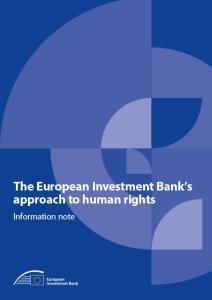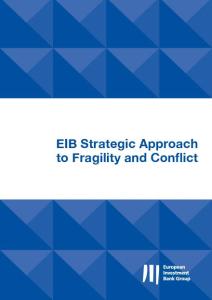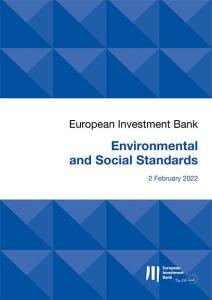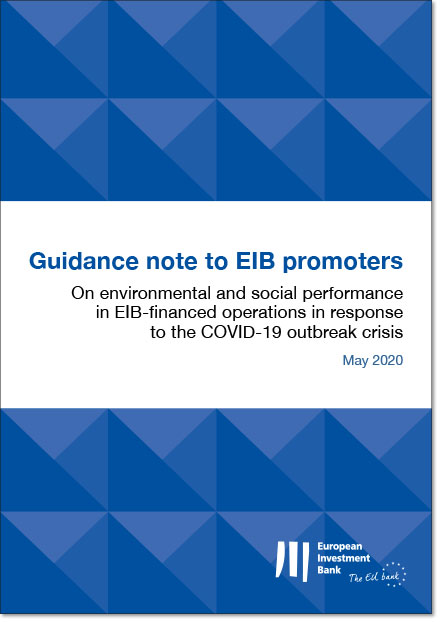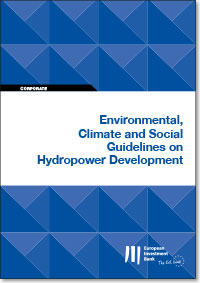Partnering for human rights
Respect for human rights is a fundamental value of the European Investment Bank. We are committed to promoting human rights in our activities and invest in projects that enhance quality of life, inclusion and equal opportunities for everyone. We work closely with EU organisations, United Nations agencies, such as the UN Environment Programme, and financial institutions to strengthen our impact worldwide.
How we work
Unlike other development finance institutions, we are legally bound by the Charter of Fundamental Rights of the European Union. We are also deeply committed to complying with international human rights laws and standards, such as the United Nations Guiding Principles on Business and Human Rights.
To ensure that our investments respect and promote human rights, we have established a series of policies, procedures and practices.
Our EIB Group Environmental and Social Policy and Standards require our promoters to integrate human rights into their environmental and social due diligence processes. This includes building and maintaining a constructive relationship with communities and people affected by the project, so that their rights, views, interests and concerns are taken into account throughout the project lifecycle. Promoters must guarantee access to information, as well as its timely disclosure and transparent dissemination without any discrimination.
Every project we finance must go through a human rights-responsive due diligence process, during which we identify its risks and impact, from the pre-appraisal stage to completion.
Depending on the outcome, we may include targeted contractual obligations, disbursement conditions or other measures to improve human rights. We exclude from our financing activities projects that:
- Inherently limit people’s individual rights and freedom, such as prisons
- Result in forced labour or harmful child labour
- Involve animal and human reproductive cloning, the sex trade, or the manufacture of tobacco or gambling
We provide transparent reports on our assessment of the environmental and social impact of our operations. We also publish key environmental and social documents relevant to each of our operations.
Freedom of expression is a fundamental human right. Yet by speaking up for the voiceless, human rights defenders sometimes put their own freedoms, or even lives, at risk. In many countries around the world they face threats of intimidation and reprisal from powerful groups seeking to silence them.
The increasing use of legal action to limit public participation and target civil society organisations is worrisome. We believe that enabling expression of dissenting voices and diverse opinions regarding our operations is at the heart of democracy and the rule of law.
We do not tolerate any reprisals, threats, intimidation, harassment, or violence against any human rights defenders, environmental activists or indigenous people advocates voicing their opinion about EIB-financed activities. We take any allegation of intimidation or reprisals seriously, and follow up, as and when appropriate.
We see meaningful stakeholder engagement as a cornerstone of sustainable and inclusive development. If someone is concerned about the impact of a project, it is possible to file a complaint with the EIB Complaints Mechanism. Its main role is to listen to concerns about an EIB Group project or activity and enable people to exercise their right to be heard. When analysing a case this could either be done through a compliance review or a dispute resolution process.
We’ve also established a Fraud Investigations Division with the capacity to independently investigate allegations of fraud and misconduct involving EIB Group financed activities and/or members of governing bodies or staff.
What is the Charter of Fundamental Rights?
The Charter of Fundamental Rights enshrines a number of personal, civic, political, economic and social rights for European Union citizens into law.
IN FOCUS
Moving to action
We have made a lot of progress on human rights, but there is still more to do. We acknowledge challenges in ensuring our clients’ human rights performance – especially in more fragile environments – and work hard to improve their and our own impact.
Following broad public consultation, the EIB Group adopted a new Environmental and Social Sustainability Framework (ESSF), which outlined for the first time our vision on how to address environmental and social challenges, as well as uphold human rights. We’ve now gone further by releasing our approach to human rights.

Our stories
-
5 October 2023
Green and humane
Kraków is upgrading urban infrastructure to make a greener city for residents and aid Ukrainian families
-
27 April 2023
Human rights in a water pipe
North Macedonia and São Tomé projects bring clean drinking water to hundreds of thousands of people
-
6 February 2023
Right on rights
-
28 November 2022
The needs of refugees
Ukrainian women and children have sought shelter in Poland. The EIB solidarity package helps local authorities support hosts and adapt infrastructure to the needs of the refugees
-
19 September 2022
Making up for lost learning
Three EIB experts talk about the education crisis and how to help children catch up after COVID-19
-
20 April 2022
More cooperation, investment, inclusivity and innovation needed to face planetary emergencies, says EIB President Hoyer
As ministers and central bank governors gather for the annual World Bank and International Monetary Fund spring meetings, Werner Hoyer, EIB President, says that multilateral financial institutions are powerful tools for tackling global challenges and must now redouble their cooperation and step up support for the investment, inclusivity and innovation the world needs.
-
20 April 2021
What does COVID-19 mean for development?
From the loss of education to the impact on businesses, jobs and the flow of finance for development, the economic scars of the pandemic will take time to heal. In the light of COVID-19, development finance backing from the European Union is more important than ever.
-
16 December 2020
Saving youngsters’ dreams
In lockdowns for COVID-19 education can suffer. But Morocco and Tunisia moved fast to get students what they need to keep learning
-
30 September 2020
Development Solutions: Credit where it’s overdue
Empowering women is key for development. The 2X Challenge supports finance for women-owned businesses, which often don’t get the funding they need.
-
17 May 2019
‘Diversity is beneficial for organisations’
Diversification is a basic financial risk management strategy. Similarly, in banking social diversity benefits us all, writes Alexander Stubb on International Day Against Homophobia, Transphobia and Biphobia.
Our publications
Explore our latest research, economic studies, surveys and other resources
-
6 February 2023
The European Investment Bank’s approach to human rights — information note
The EIB is committed to respecting and promoting human rights in its lending operations. This document details our policies, procedures and practices to avoid and address human rights risks and impacts.
-
2 November 2022
Support for female entrepreneurs: Survey evidence for why it makes sense
Supporting female entrepreneurs makes good economic sense, as women-led businesses generate wider economic, social and environmental benefits, according to an analysis of three recent surveys.
-
4 October 2022
EIB Strategic Approach to Fragility and Conflict
The European Investment Bank adopted its first Strategic Approach to Fragility and Conflict. It outlines the bank’s vision and approach to working in fragile and conflict affected contexts, with the aim to enhance EIB’s development impact.
-
4 March 2022
EIB Environmental and Social Standards Overview
An brief overview of the recently published revised set of EIB Environmental and Social Standards.
-
3 February 2022
European Investment Bank Environmental and Social Standards
The EIB Environmental and Social Standards describe the requirements that all EIB-financed projects must meet.
-
29 May 2020
COVID-19 and Environmental and Social Sustainability
The unprecedented nature of the COVID-19 pandemic means that all aspects of EIB financed operations may be impacted by it, including those relating to environmental and social matters. As the Bank is developing its response to the pandemic, it is of vital importance that its environmental and social objectives continue being met in line with the EIB Environmental and Social Standards.
-
8 October 2019
Environmental, Climate and Social Guidelines on Hydropower Development
The EIB’s Environmental, Climate and Social Guidelines on Hydropower Development set out the EIB’s objectives for investments in hydropower projects, establishing sector-specific standards and criteria, which promoters should meet.

